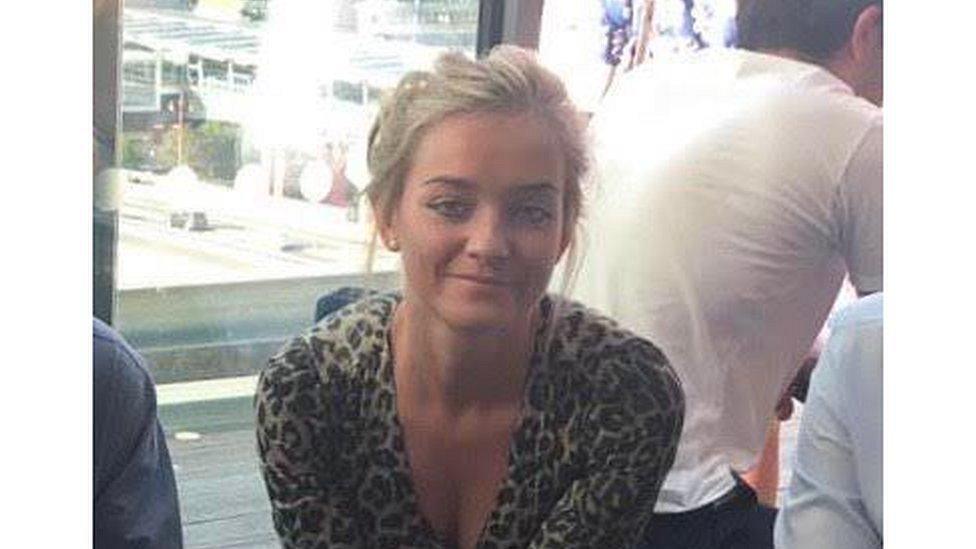Mask exemptions must be clearer, rape campaigner says
- Published

A rape survivor is calling for government to "educate" the public about face-covering exemptions, as England moves into a second lockdown.
Having her mouth covered still prompts traumatic flashbacks for Georgina Fallows, who was attacked some years ago.
And now, she feels re-traumatised by being verbally abused in public when she doesn't wear a mask.
She has written to ministers with seven mental-health and disability charities.
'Public understanding'
They are asking the government to promote a "recognised badge [or] identifier to signify the wearer as exempt".
But, the letter states, a badge "is no substitute for greater public understanding" of why people might not be able to wear face coverings and that this reason may be invisible.
"My attacker literally pulled me off the street and raped me," Ms Fallows says.
"Having something in front of my mouth feels like his hand."
Severe distress
She has severe post-traumatic stress disorder and flashbacks, sometimes so extreme she has been sedated by paramedics.
And she has waived her right to anonymity in order to campaign for greater awareness.
Face coverings are mandatory in most indoor public spaces in England, including shops and public transport.
But there are exemptions for people for whom "putting on, wearing or removing a face covering" will cause "severe distress".
'Screamed at'
People who cannot wear a mask because of a physical or mental illness or disability are also exempt.
There is a note that can be downloaded from the government website.
But Ms Fallows is concerned it is not viewed as "official".
And when she has shown her exemption pass after being challenged, people will often not accept it.
The 30-year-old solicitor has been "screamed at" for not wearing a mask.
And one woman accused "people like me of killing her father".
There are also fears the notes could be misused by people who do not have a valid reason not to wear a face covering.
Ms Fallows wants government to consider backing the Hidden Disabilities charity's sunflower lanyard, which is already being used for this purpose and is widely recognised.
'Medical emergency'
For now, though, she avoids shops and transport wherever possible for fear of being verbally abused.
"People think it's just a bit uncomfortable," wearing a mask.
But for Ms Fallows, it can be a "medical emergency", resulting in three- or four-hour flashbacks that end with her being restrained and unconscious.
And it is a problem shared by people with a range of other mental-health conditions, disabilities, autism, and Alzheimer's disease.
Hate crimes
The letter, sent to Public Health Minister Jo Churchill, Disability Minister Justin Tomlinson and former Disability Minister Penny Mordaunt, was co-signed by charities including Mind, Sense, Alzheimer's Society and Disability Rights UK.
A Disability Rights UK survey of 350 people uncovered reports of people fearing hate crimes and feeling like prisoners in their own homes.
Difficulties wearing face coverings particularly affect people with mental-health conditions, sensory disorders and hidden disabilities such as autism, its research suggests.
Heightened breathlessness
Widespread misinformation online has suggested face coverings can physically impair breathing.
The British Lung Foundation says: "Wearing a mask does not reduce a person's oxygen supply or cause a build-up of carbon dioxide.
"You may have read stories that say that it can - but this isn't true."
But wearing a face covering can give people a psychological perception of heightened breathlessness.
And Ms Fallows says those who do not wear one "through choice... do a genuine disservice to those who 'cannot' wear one and are exempt".
"They make it easier for those who are sceptical of the exemptions to case aspersions on those who qualify".
If you have been affected by the issues raised in this article, help and advice can be found here.